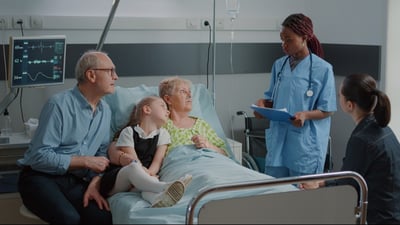FORCE's eXamining the Relevance of Articles for You (XRAY) program looks behind the headlines of cancer news to help you understand what the research means for you.
XRAY is a reliable source of hereditary cancer research-related news and information.
Learn more about the XRAY program
Categories Palliative Care, Quality of Life, Survivorship
Topic : Experts call for early palliative care for cancer patients
Most relevant for: Cancer patients
People with cancer need support and care not only at the end of life but from the time of diagnosis. At the 2024 American Society of Clinical Oncology (ASCO) annual meeting, the organization’s president urged cancer healthcare professionals to make palliative care central to cancer treatment. (Posted 7/17/24)
Read More
Update : News from the FDA: New ovarian cancer treatment and imaging drug
Most relevant for: People with ovarian cancer.
The FDA recently approved a new treatment for some people with ovarian cancer. The FDA also approved a new imaging drug that can help surgeons find and remove ovarian cancer. (Posted 5/30/24)
Read More
Relevance: High


Strength of Science: High


Research Timeline: Post Approval


Study : Ovary removal reduces risk of death from any cause in people with BRCA mutations
Relevance: High


Strength of Science: High


Research Timeline: Post Approval


Most relevant for: People who have had a risk reducing bilateral oophorectomy
People who test positive for an inherited BRCA1 or BRCA2 mutation can reduce their risk of ovarian cancer by having both ovaries and fallopian tubes removed. A study published in 2024 found an added benefit of this surgery – a lower risk of death from any cause by age 75. (Posted 5/23/24)
Read More
Relevance: Medium


Personal Story : Living a full life with Li-Fraumeni syndrome
Relevance: Medium


Most relevant for: People with Li-Fraumeni syndrome
This XRAY review is about a five-time cancer survivor who has an inherited mutation in the TP53 gene. People with inherited mutations in TP53 have Li-Fraumeni syndrome, which is linked to a very high lifetime risk for many types of cancer. Here we share his inspiring story and provide more information on Li-Fraumeni syndrome. (Posted 4/16/24)
Read More
Update : News from the FDA - Two new metastatic colorectal cancer treatments
Most relevant for: People with colorectal cancer
The FDA recently approved two new treatments for metastatic colorectal cancer. (Posted 3/22/24)
Read More
Relevance: High


Quality of Writing: High


Article : Signs of endometrial cancer: Six survivor stories
Relevance: High


Quality of Writing: High


Most relevant for: Women who want to learn more about the signs of or are at risk for endometrial cancer.
This article shares the experiences of six women diagnosed with endometrial cancer. It highlights the most common signs of endometrial cancer. (Posted 11/16/23)
Este artículo está disponible en español.
Read More
Topic : Sex and intimacy after breast cancer
Most relevant for: People with breast cancer or metastatic breast cancer in sexual or intimate relationships and their partners
A breast cancer diagnosis and treatment can affect relationships with romantic partners. This review highlights two studies that looked at how people with breast cancer and their partners are affected, how they cope, how best to communicate with each other and how to talk with healthcare providers about concerns related to cancer and sexuality. (Posted 8/8/23)
Este artículo está disponible en español.
Read More
Relevance: Medium


Strength of Science: Medium-High


Research Timeline: Human Research


Study : Early removal of ovaries may be linked to small increase in risk of Parkinson’s disease in later life
Relevance: Medium


Strength of Science: Medium-High


Research Timeline: Human Research


Most relevant for: Women considering risk-reducing removal of both ovaries
The lifetime risk of developing Parkinson’s disease is low. However, having surgery to remove both ovaries before natural menopause can slightly increase the risk of Parkinson's disease later in life. Researchers studied over 20 years of medical records, which confirmed this small increase in risk, particularly for women who have their ovaries removed before age 43. (Posted 5/3/23)
Este artículo está disponible en español.
Read More
Relevance: High


Strength of Science: High


Study : Treatment to reduce bone fractures also improves breast cancer survival in postmenopausal people
Relevance: High


Strength of Science: High


Most relevant for: People with early-stage breast cancer who are post-menopausal
A large study looked at the effects of adding the bone-protective drug denosumab (Prolia), to standard hormone therapy for the treatment of early-stage, postmenopausal, HR-positive breast cancer. The researchers found that adding denosumab to aromatase inhibitor hormonal therapy improved bone health, disease-free survival and overall survival. (Posted 2/27/23)
Este artículo está disponible en español.
Read More
Relevance: High


Strength of Science: High


Study : What influences aggressive end-of-life care for ovarian cancer?
Relevance: High


Strength of Science: High


Most relevant for: People with advanced ovarian cancer
Aggressive medical treatment is often given to people with terminal ovarian cancer when prior treatment has stopped working. This aggressive end-of-life treatment conflicts with clinical guidelines, may increase pain and suffering and does not extend life. This study found that the end-of-life care that a person with ovarian cancer receives is influenced by their doctors. (Posted 1/3/23)
Este artículo está disponible en español.
Read More